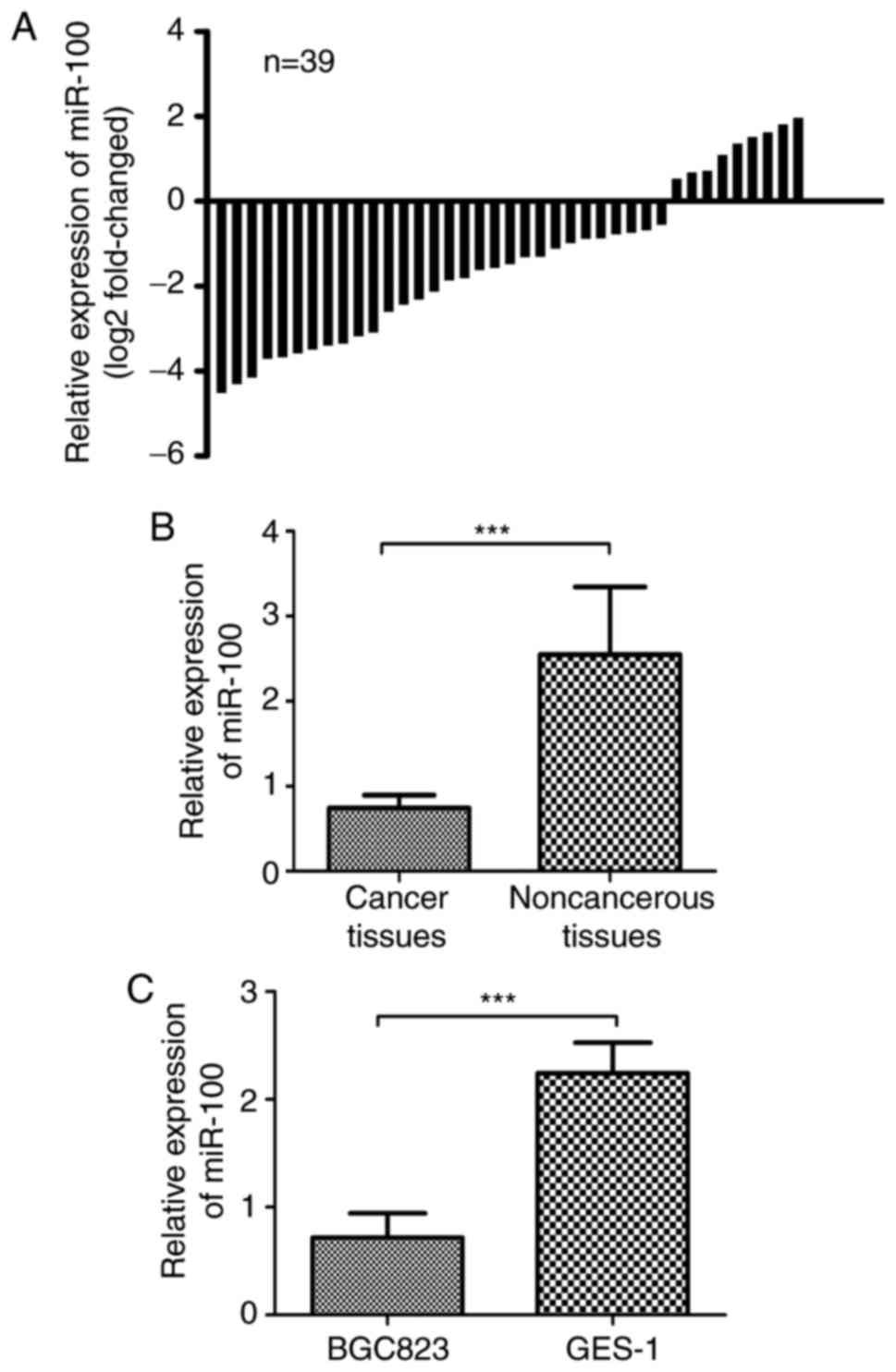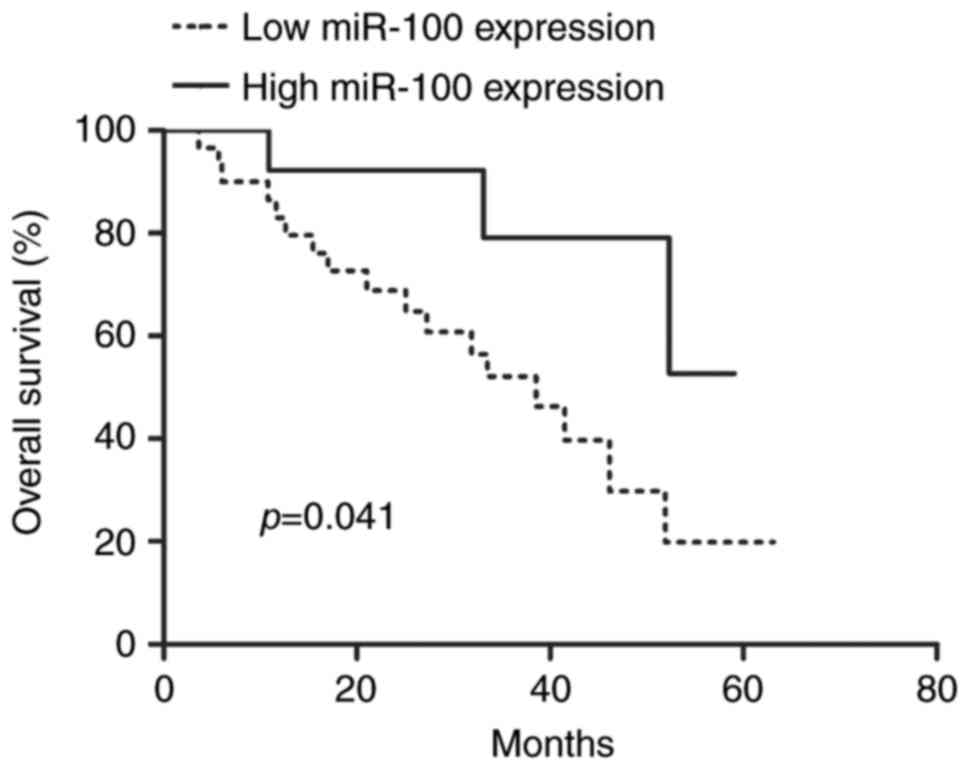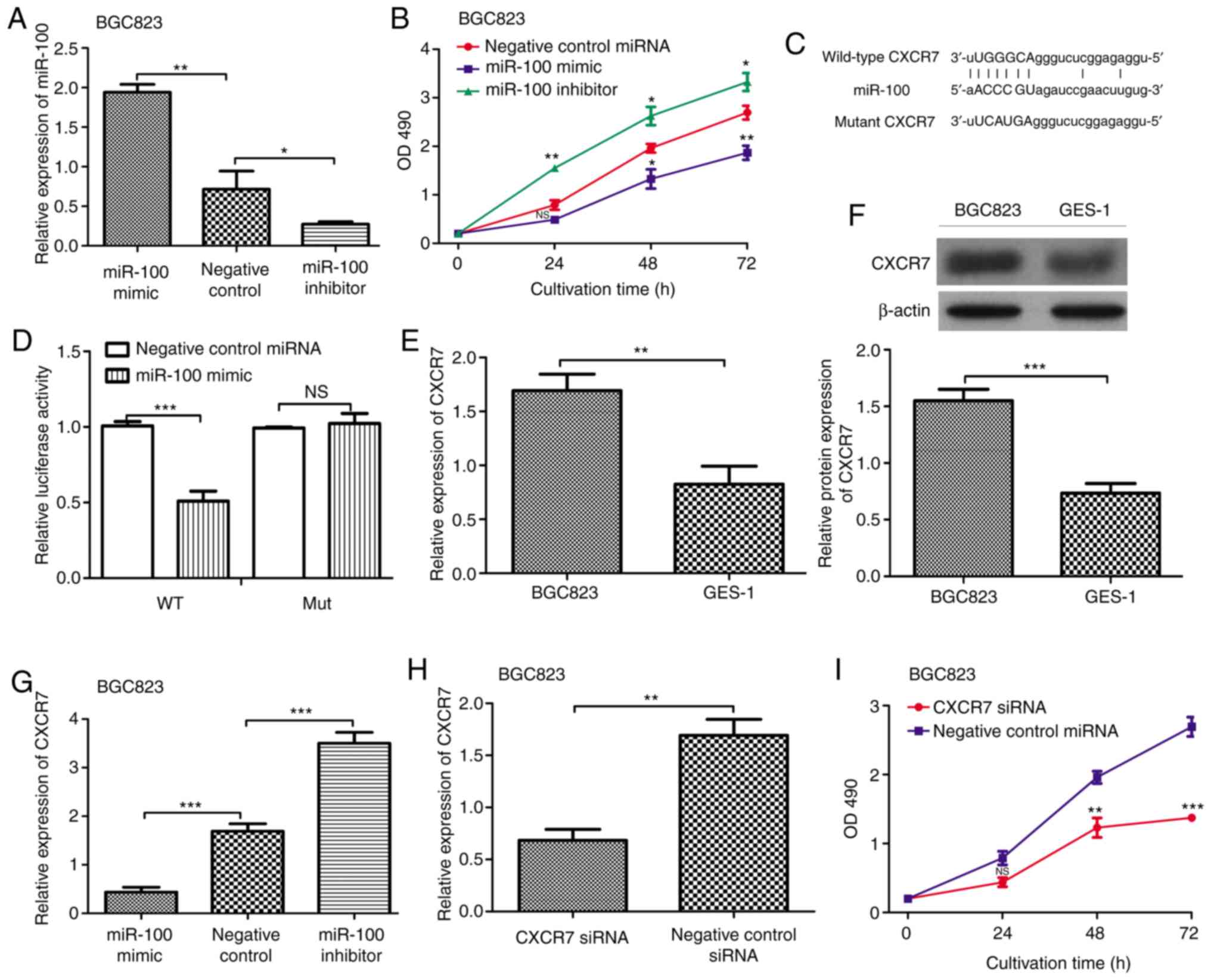|
1
|
Tinico A, Gottardi LF and Boechat ED:
Gastric cancer in the excluded stomach 10 years after gastric
bypass. Case Rep Surg. 2015:4682932015.PubMed/NCBI
|
|
2
|
Siegel RL, Miller KD and Jemal A: Cancer
Statistics, 2016. CA Cancer J Clin. 66:7–30. 2016. View Article : Google Scholar : PubMed/NCBI
|
|
3
|
Malvezzi M, Bonifazi M, Bertuccio P, Levi
F, La Vecchia C, Decarli A and Negri E: An age-period-cohort
analysis of gastric cancer mortality from 1950 to 2007 in Europe.
Ann Epidemiol. 20:898–905. 2010. View Article : Google Scholar : PubMed/NCBI
|
|
4
|
Torre LA, Bray F, Siegel RL, Ferlay J,
Lortet-Tieulent J and Jemal A: Global cancer statistics, 2012. CA
Cancer J Clin. 65:87–108. 2015. View Article : Google Scholar : PubMed/NCBI
|
|
5
|
Sionov RV: MicroRNAs and
glucocorticoid-induced apoptosis in lymphoid maligancies. ISRN
hematol. 2013:3482122013. View Article : Google Scholar : PubMed/NCBI
|
|
6
|
Santpere G, Lopez-Valenzuela M,
Petit-Marty N, Navarro A and Espinosa-Parrila Y: Differences in
molecular evolutionary rates among microRNAs in the human and
chimpanzee genomes. BMC Genomics. 17:5282016. View Article : Google Scholar : PubMed/NCBI
|
|
7
|
Shen Y, Gong JM, Zhou LL and Sheng JH:
Mir-451 as a new tumor marker for gastric cancer. Oncotarget.
8:56542, 565452017.
|
|
8
|
Adlakha YK and Saini N: Brain microRNAs
and insights into biological functions and therapeutic potential of
brain enriched miRNA-128. Mol Cancer. 13:332014. View Article : Google Scholar : PubMed/NCBI
|
|
9
|
Donohoe OH, Henshilwood K, Way K,
Hakimjavadi R, Stone DM and Walls D: Identification and
characterization of cyprinid herpesvirus-3 (CyHV-3) encoded
MicroRNAs. PLoS One. 10:e01254342015. View Article : Google Scholar : PubMed/NCBI
|
|
10
|
Wang Q and Yu JH: MiR-129-5p suppresses
gastric cancer cell invasion and proliferation by inhibiting
COL1A1. Biochem Cell Biol. May 8–2017.(Epub ahead of print).
|
|
11
|
Xie M, Dart DA, Guo T, Xing XF, Cheng XJ,
Du H, Jiang WG, Wen XZ and Ji JF: MicroRNA-1 acts as a tumor
suppressor microRNA by inhibiting angiogenesis-related growth
factors in human gastric cancer. Gastric Cancer. May 10–2017.(Epub
ahead of print). View Article : Google Scholar
|
|
12
|
Datta J, Kutay H, Nasser MW, Nuovo GJ,
Wang B, Majumder S, Liu CG, Volinia S, Croce CM, Schmittgen TD, et
al: Methylation mediated silencing of microRNA-1 gene and its role
in hepatocellular carcinogenesis. Cancer Res. 68:5049–5058. 2008.
View Article : Google Scholar : PubMed/NCBI
|
|
13
|
Zang Y, Wang T, Pan J and Gao F: miR-215
promotes cell migration and invasion of gastric cancer cell lines
by targeting FOXO1. Neoplasma. 64:579–587. 2017. View Article : Google Scholar : PubMed/NCBI
|
|
14
|
Jafarzadeh-Samani Z, Sohrabi S,
Shirmohammadi K, Effatpanah H, Yadegarazari R and Saidijam M:
Evaluation of miR-22 and miR-20a as diagnostic biomarkers for
gastric cancer. Chin Clin Oncol. 6:162017. View Article : Google Scholar : PubMed/NCBI
|
|
15
|
Hu CE, Du PZ, Zhang HD and Huang GJ: Long
noncoding RNA CRNDE promotes proliferation of gastric cancer cells
by targeting miR-145. Cell Physiol Biochem. 42:13–21. 2017.
View Article : Google Scholar : PubMed/NCBI
|
|
16
|
Qin C, Huang RY and Wang ZX: Potential
role of miR-100 in cancer diagnosis, prognosis, and therapy. Tumor
Biol. 36:1403–1409. 2015. View Article : Google Scholar
|
|
17
|
Zhou HC, Fang JH, Luo X, Zhang L, Yang J,
Zhang C and Zhuang SM: Downregulation of microRNA-100 enhances the
ICMT-Rac1 signaling and promotes metastasis of hepatocellular
carcinoma cells. Oncotarget. 5:12177–12188. 2014. View Article : Google Scholar : PubMed/NCBI
|
|
18
|
Azizmohammadi S, Azizmohammadi S, Safari
A, Kosari N, Kaghazian M, Yahaghi E and Seifoleslami M: The role
and expression of miR-100 and miR-203 profile as prognostic markers
in epithelial ovarian cancer. Am J Tansl Res. 8:2403–2410.
2016.
|
|
19
|
Jiang Q, He M, Guan S, Ma M, Wu H, Yu Z,
Jiang L, Wang Y, Zong X, Jin F and Wei M: MicroRNA-100 suppresses
the migration and invasion of breast cancer cells by targeting
FZD-8 and inhibiting Wnt/β-catenin signaling pathway. Tumor Biol.
37:5001–5011. 2016. View Article : Google Scholar
|
|
20
|
Gu L, Li H, Chen L, Ma X, Gao Y, Li X,
Zhang Y, Fan Y and Zhang X: MicroRNAs as prognostic molecular
signatures in renal cell carcinoma: A systematic review and
meta-analysis. Oncotarget. 6:32545–32560. 2015. View Article : Google Scholar : PubMed/NCBI
|
|
21
|
Burns JM, Summers BC, Wang Y, Melikian A,
Berahovich R, Miao Z, Penfold ME, Sunshine MJ, Littman DR, Kuo CJ,
et al: A novel chemokine receptor for SDF-1 and I-TAC involved in
cell survival, cell adhesion, and tumor development. J Exp Med.
203:2201–2213. 2006. View Article : Google Scholar : PubMed/NCBI
|
|
22
|
Liu Z, Teng XY, Meng XP and Wang BS:
Expression of stromal cell-dervied factor 1 and CXCR7 ligand
receptor system in pancreatic adenocarcinoma. World J Surg Oncol.
12:3482014. View Article : Google Scholar : PubMed/NCBI
|
|
23
|
Hattermann K, Held-Feindt J, Lucius R,
Müerköster SS, Penfold ME, Schall TJ and Mentlein R: The chemokine
receptor CXCR7 is highly expressed in human glioma cells and
mediates antiapoptoic effects. Cancer Res. 70:3299–3308. 2010.
View Article : Google Scholar : PubMed/NCBI
|
|
24
|
Nambara S, Iguchi T, Oki E, Tan P, Maehara
Y and Mimori K: Overexpression of CXCR7 is a novel prognostic
indicator in gastric cancer. Dig Surg. 34:312–318. 2017. View Article : Google Scholar : PubMed/NCBI
|
|
25
|
Zhou SM, Zhang F, Chen XB, Jun CM, Jing X,
Wei DX, Xia Y, Zhou YB, Xiao XQ, Jia RQ, et al: miR-100 suppresses
the proliferation and tumor growth of esophageal squamous cancer
cells via targeting CXCR7. Oncol Rep. 35:3453–3459. 2016.
View Article : Google Scholar : PubMed/NCBI
|
|
26
|
Livak KJ and Schmittgen TD: Analysis of
relative gene expression data using real-time quantitative PCR and
the 2(-Delta Delta C(T)) method. Methods. 25:402–408. 2001.
View Article : Google Scholar : PubMed/NCBI
|
|
27
|
White NM and Yousef GM: MicroRNAs:
Exploring a new dimension in the pathogenesis of kidney cancer. BMC
Med. 8:652010. View Article : Google Scholar : PubMed/NCBI
|
|
28
|
Jamali Z, Asl Aminabadi N, Attaran R,
Pournagiazar F, Ghertasi Oskouei S and Ahmadpour F: MicroRNAs as
prognostic molecular signatures in human head and neck squamous
cell carcinoma: A systematic review and meta-analysis. Oral Oncol.
51:321–331. 2015. View Article : Google Scholar : PubMed/NCBI
|
|
29
|
Fu HL, Pan HX, Zhao B, Dong BC, Shao L, Fu
GS, Wang Q and Li M: MicroRNA-100 inhibits bone morphogenetic
protein-induced osteoblast differentiation by targeting Smad1. Eur
Rev Med Pharmacol Sci. 20:3911–3919. 2016.PubMed/NCBI
|
|
30
|
Luan YX, Zhang S, Zuo L and Zhou L:
Overexpression of miR-100 inhibits cell proliferation, migration,
and chemosensitivity in human glioblastoma through FGFR3. Onco
Targets Ther. 8:3391–3400. 2015.PubMed/NCBI
|

















